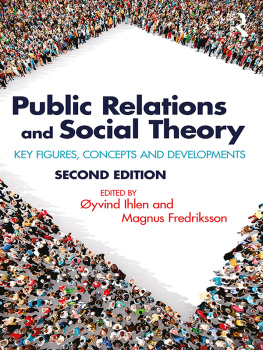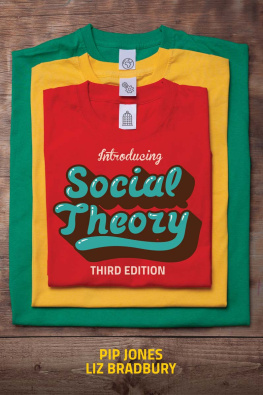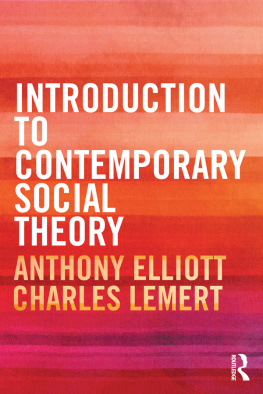This wonderfully clearly written book shows professional and trainee social workers how they can greatly improve their practice by becoming practical sociologists. It also demonstrates to sociologists how their ideas can inspire concrete activities that are socially beneficial and positively transformative.
David Inglis, University of Helsinki, Finland
A rich meditation on the intersection between social theory and social work. Christopher Thorpes excellent contribution brings into focus the importance of ideas and concepts for social work. Wonderful to see the inclusion of Norbert Elias who reflects on the emergence of new forms of civilized life mirrored by much of social works front-line engineering.
Stephen A. Webb, Glasgow Caledonian University, Scotland
Social Theory for Social Work by Chris Thorpe provides a very good foundation for sociological social work approaches to professional practice that many of us have been advocating. It covers crucial sociological perspectives from Durkheim to Bourdieu and applies them to social work, using a critical reflective stance. Moreover, its approach to theory is one that students and practitioners can easily follow.
Lena Dominelli, Co-Director, Institute of Hazard, Risk and Resilience, Durham University, UK
Social Theory for Social Work
Trying to understand what the world looks through the eyes of individuals and groups and how it shapes the ways they think and act is something social workers do all the time. It is what social theorists do too. This book identifies and explains in a highly accessible manner the absolute value of social theory for social work. Drawing on the theoretical ideas and perspectives of a wide range of classical and modern social theorists, the book demonstrates the insights their work can bring to bear on social work practice scenarios, issues and debates.
Departing with the work of the classical theorists, the book covers a diverse range of theoretical traditions including phenomenology, symbolic interactionism, Norbert Elias, Michel Foucault, Pierre Bourdieu, feminism and globalization theory. Putting to work ideas from these different perspectives, a range of social work scenarios, issues and debates are opened up and explored. The final chapter brings together the various theoretical strands, and critically considers the contribution they can make towards realizing core social work values in a rapidly globalizing world.
Demonstrating exactly how and in what ways social theory can make important and enduring contributions to social work, Social Theory for Social Work is essential reading for social work students, practitioners and professionals alike.
Christopher Thorpe is a lecturer in sociology at the University of Exeter. His areas of expertise include classical and modern social theory, cultural sociology and social justice. Previously he was at the Robert Gordon University, Aberdeen, where he taught sociology and social theory to social work students. Together with David Inglis, he is author of An Invitation to Social Theory (2012).
Student Social Work
www.routledge.com/Student-Social-Work/book-series/SSW
This exciting new textbook series is ideal for all students studying to be qualified social workers, whether at undergraduate or masters level. Covering key elements of the social work curriculum, the books are accessible, interactive and thought-provoking.
New titles
Human Growth and Development
John Sudbery
Social Work Placements
Mark Doel
Social Work
A Reader
Viviene E. Cree
Sociology for Social Workers and Probation Officers
Viviene E. Cree
Integrating Social Work Theory and Practice
A Practical Skills Guide
Pam Green Lister
Social Work, Law and Ethics
Jonathan Dickens
Becoming a Social Worker, 2nd ed.
Global Narratives
Viviene E. Cree
Social Work and Social Policy, 2nd ed.
An Introduction
Jonathan Dickens
Mental Health Social Work in Context, 2nd ed.
Nick Gould
Forthcoming title
Social Work with Children and Young People, Their Families and Carers
Janet Warren
First published 2018
by Routledge
2 Park Square, Milton Park, Abingdon, Oxon OX14 4RN
and by Routledge
711 Third Avenue, New York, NY 10017
Routledge is an imprint of the Taylor & Francis Group, an informa business
2018 Christopher Thorpe
The right of Christopher Thorpe to be identified as author of this work has been asserted by him in accordance with sections 77 and 78 of the Copyright, Designs and Patents Act 1988.
All rights reserved. No part of this book may be reprinted or reproduced or utilised in any form or by any electronic, mechanical, or other means, now known or hereafter invented, including photocopying and recording, or in any information storage or retrieval system, without permission in writing from the publishers.
Trademark notice: Product or corporate names may be trademarks or registered trademarks, and are used only for identification and explanation without intent to infringe.
British Library Cataloguing-in-Publication Data
A catalogue record for this book is available from the British Library
Library of Congress Cataloging-in-Publication Data
A catalogue record for this book has been requested
ISBN: 978-0-415-82639-6 (hbk)
ISBN: 978-0-415-82640-2 (pbk)
ISBN: 978-0-203-52963-8 (ebk)
Typeset in Bembo
by Apex CoVantage, LLC
For Oscar, Marcus-Anthony and Samantha.
1
Why Social Theory Matters for Social Work
Philosophy and the study of the real world have the same relation to one another as onanism and sexual love.
Karl Marx (1998 [184546]: 253)
Of all the quotations you might expect a book about social theory and social work to open with, one that makes reference to sexual love and onanism (masturbation) might not strike you as the most likely. The questions ensue: why was the decision taken to use that quote to open this book? What was the purpose of doing so? How does it relate to the theoretical ideas, concepts and discussions that fill the ensuing pages? These questions may well be in the forefront of your mind. The idea the quotation is intended to express is certainly a provocative one! Why use it to open a book about social theory and social work? Let us begin by taking a moment to explain why the decision was taken to use that quotation and how it relates to the relationship between social theory and social work in the present day.
Born in 1815, in Trier, Germany, Karl Marx was a foundational figure in the development of social theory. As a young philosophy student at the University of Berlin, Marx quickly established a reputation as a highly critical and provocative thinker. Surveying the philosophical scene of the day, Marx was convinced his contemporaries had lost sight of the true purpose of philosophy. Up until now, proclaimed Marx (1998 [184546]), philosophers have only interpreted the world in various ways the point, however, is to change it! Marx was despairing of what he regarded as the overly abstract questions and debates posed by academic philosophers. In his view, philosophy had become little more than self-indulgent mental stimulation mental masturbation as he likens it an activity he considered even more reprehensible because it was divorced from people in the real world, whose lives it did little to serve or positively change.








